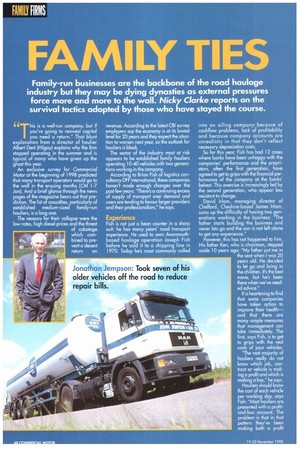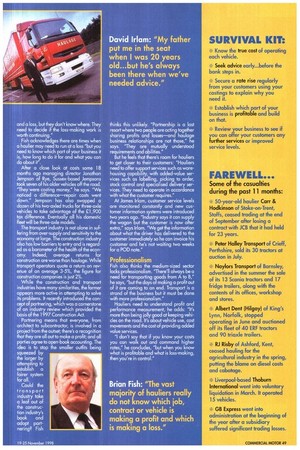FAMILY TIES
Page 50

Page 51

If you've noticed an error in this article please click here to report it so we can fix it.
Family-run businesses are the backbone of the road haulage industry but they may be dying dynasties as external pressures force more and more to the wall. Nicky Clarke reports on the survival tactics adopted by those who have stayed the course.
"T his is a well-run company, but if you're going to reinvest capital you need a return." That blunt explanation from a director of haulier Albert Dent (Hi'gay) explains why the firm stopped operating in the summer and is typical of many who have given up the ghost this year.
An exclusive survey for Commercial Motor at the beginning of 1998 predicted that many transport operators would go to the wall in the ensuing months (CM 1-7 Jan). And a brief glance through the news pages of the magazine bears out that prediction. The list of casualties, particularly of established medium-sized family-run hauliers, is a long one. The reasons for their collapse were the low rates, high diesel prices and the threat of cabotage which combined to prevent a decent revenue. According to the latest CBI survey employers say the economy is at its lowest level for 20 years and they expect the situation to worsen next year, so the outlook for hauliers is bleak.
The sector of the industry most at risk appears to be established family hauliers operating 10-40 vehicles with two generations working in the company. According to Brian Fish of logistics consultancy DFF International, these companies haven't made enough changes over the past few years. "There's a continuing excess of supply of transport over demand and users are tending to favour larger providers and their professionalism," he says.
Experience
Fish is not just a bean counter in a sharp suit: he has many years' road transport experience. He used to own Avonmouthbased haulage operation Joseph Fish before he sold it to a shipping line in 1970. Today he's most common y called
into an ailing company because of cashflow problems, lack of profitability and because company accounts are unrealistic in that they don't reflect necessary depreciation costs. So Far this year, Fish has had 12 cases where banks have been unhappy with the companies' performance and the proprietors, often the first generation, have agreed to get to grips with the financial performance of the company at the banks' behest. This exercise is increasingly led by the second generation, who appear less resistant to change. David Irlam, managing director of Chelford, Cheshire-based James Irlam, sums up the difficulty of having two generations working in the business: "The father starts building the business and never lets go and the son is not left alone to get any experience." However, this has not happened to him. His father Ken, who is chairman, stepped aside 10 years ago: "My father put me in the seat when I was 20 years old. He decided to let go and bring in the children. It's the best move, but he's been there when we've needed advice."
It is heartening to find that some companies have taken action to improve their health— and that there are many simple measures that management can take immediately. The first, says Fish, is to get to grips with the real costs of your vehicles.
"The vast majority of hauliers really do not know which job, contract or vehicle is making a profit and which is making a loss," he says. Hauliers should know the cost of each vehicle per working day, says Fish: "Most hauliers are presented with a profitand-loss account. The problem is that in that pattern they've been making both a profit and a loss, but they don't know where. They need to decide if the loss-making work is worth continuing." Fish acknowledges there are times when a haulier may need to run at a loss 'but you need to know which part of your business it is, how long to do it for and what you can do about it".
After a close look at costs some 18 months ago managing director Jonathan Jempson of Rye, Sussex-based Jempsons took seven of his older vehicles off the road. "They were costing money," he says. "We noticed a difference—repair costs went down." Jempson has also swapped a dozen of his two-axled trucks for three-axle vehicles to take advantage of the £1,900 tax difference. Eventually all his domestic fleet will be three-axle models.
The transport industry is not alone in suffering from over-supply and sensitivity to the economy at large. The construction industry also has low barriers to entry and is regarded as a barometer of the health of the economy. Indeed, average returns for construction are worse than haulage. While transport operators quote a return on revenue of an average 3-5%, the figure for construction companies is just 2%. While the construction and transport industries have many similarities, the former appears more active in attempting to solve its problems. It recently introduced the concept of partnering, which was a cornerstone of an industry review which provided the basis of the 1997 Construction Act.
Partnering means that everyone, from architect to subcontractor, is involved in a project from the outset; there's a recognition that they are all out to make a profit; and all parties agree to open-book accounting. The idea is to stop the smaller outfits being squeezed by the larger by
attempting to •
establish a fairer system for all.
Could die transport industry take a leaf out of the construc tion industry's book and adopt partnering? Fish thinks this unlikely. "Partnership is a last resort where two people are acting together sharing profits and losses—and haulage business relationships are not those," he says. "They are mutually understood requirements and abilities."
But he feels that there's room for hauliers to get closer to their customers: 'Hauliers need to offer support services such as warehousing capability, with added-value services such as labelling, picking to order, stock control and specialised delivery services. They need to operate in accordance with what the customer requires."
At James Irlam, customer service levels are monitored constantly and new customer information systems were introduced two years ago. "Industry says it can supply the wagon but the customer is now alter extra," says !dam. 'We get the information about what the driver has delivered to the customer immediately so he can invoice his customer and he's not waiting two weeks for a POD note."
Professionalism
Fish also thinks the medium-sized sector lacks professionalism. "There'll always be a need for transporting goods from A to B," he says, "but the days of making a profit out of it are coming to an end. Transport is a strand of the business but it must be done with more professionalism." Hauliers need to understand profit and performance measurement, he adds: "It's more than being jolly good at keeping vehicles on the road. It's about vehicle use, cost movements and the cost of providing added value services.
"I don't say that if you know your costs you can walk out and command higher rates," he concludes, "but when you know what is profitable and what is loss-making, then you're in control."
SURVIVAL KIT:
:=1; Know the true cost of operating each vehicle.
;..P. Seek advice early...before the bank steps in.
Secure a rate rise regularly from your customers using your castings to explain why you need it.
;14. Establish which part of your business is profitable and build on that.
+ Review your business to see if you can offer your customers any holier services or improved service levels.
FAREWELL...
Some of the casualties during the past 11 months:
+ 50-year-old haulier Carr & Hodkinson of Stoke-on-Trent, Staffs, ceased trading at the end of September after losing a contract with JCB that it had held for 23 years.
Peter Halley Transport of Crieff, Perthshire, sold its 30 tractors at auction in July.
Naylors Transport of Barnsley, advertised in the summer the sale of its 13 Scania tractors and 17 fridge trailers, along with the contents of its offices, workshop and stores.
Albert Dent (Hilgay} of King's Lynn, Norfolk, stopped operating in June and auctioned off its fleet of 40 ERF tractors and 90 triaxle trailers.
+ Ri Risby of Ashford, Kent, ceased hauling for the agricultural industry in the spring, putting the blame on diesel costs and cabotage.
Liverpool-based Thoburn International went into voluntary liquidation in March. It operated 15 vehicles.
7:"7 GB Express went into administration at the beginning of the year after a subsidiary suffered significant trading losses.
















































































































